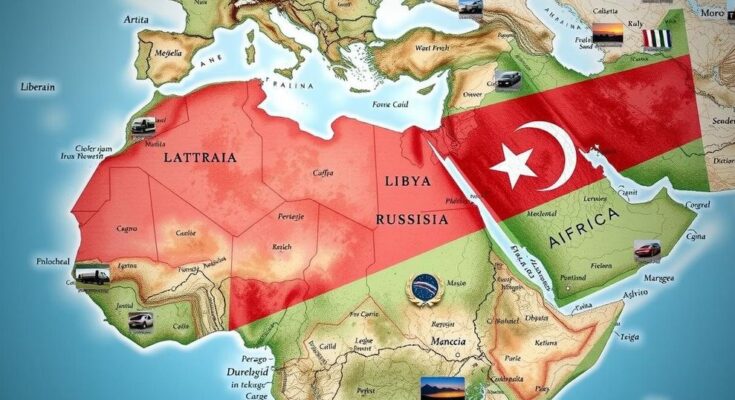The fall of Assad’s regime in Syria has compelled Russia to turn its focus towards Libya as a strategic substitute for maintaining influence in Africa. Russian mercenaries support Haftar in eastern Libya against the UN-backed GNU, amidst ongoing military resource transfers from Syria. This shift underscores Russia’s intention to counter western interests and solidify its position in a fractured political landscape, albeit with more complexity than previously experienced in Syria.
The recent destabilization of Bashar al-Assad’s regime in Syria has prompted Russia to reassess its strategic focus within the region, notably shifting its attention toward Libya. Analysts suggest that Libya is perceived as a critical foothold for continuing Russian influence in Africa and mitigating losses in Syria. Currently, Russian mercenaries support Khalifa Haftar’s forces in eastern Libya against the UN-recognized Government of National Unity (GNU) in Tripoli, which is backed by Turkey.
In light of these dynamics, experts highlight that Moscow’s military operations in Libya are rapidly expanding, with significant transfers of military resources, including advanced radar systems and anti-aircraft batteries, from Syria. Investigations indicated at least 1,800 Russian troops operating in Libya by May 2024, as well as military equipment being delivered to strategic locations, including the port of Tobruk. This signifies a growing commitment by Russia to establish a more substantial military presence in Libya amid changing geopolitical circumstances.
Moreover, analysts assert that the Kremlin’s actions are aimed at preserving its African missions and exercising its military capacity to counter western interests that may challenge Russian influence in the area. With the landscape in Libya being more multifaceted and contested than in Syria, where Russian activities could proceed with more discretion in the absence of western oversight, maintaining a low-profile presence will be more challenging in Libya.
As Russia grapples with these concerns, strategic calculations must also accommodate the interests of various local and international actors, including Turkey, the UAE, and Egypt, who have their respective alliances and stakes in the Libyan conflict. Consequently, while Libya serves as an alternative for Russia, the complexities involved suggest that the road ahead is fraught with complications that require astute navigation to achieve their objectives.
The geopolitical landscape in the Middle East and North Africa has been altered significantly following the recent developments in Syria, particularly the decline of Assad’s regime. Historically, Syria served as a vital outpost for Russia’s military ambitions in the Mediterranean and Africa, enabling Moscow to project its power and test its capabilities. With the shift in leadership in Syria, Russia is compelled to find new bases of operation, leading it to reconsider Libya as a strategic alternative. The ongoing civil conflict in Libya since the ousting of Muammar Gaddafi in 2011 has created a fragmented political environment, favorable for countries like Russia seeking to expand their influence. Furthermore, the presence of various international actors complicates the security landscape, necessitating a delicate approach by Moscow in forming partnerships and establishing military installations.
In summary, the deterioration of Russian influence in Syria has catalyzed an urgent pivot towards Libya as a strategic alternative for fostering military and political presence in Africa. The intricate dynamics of Libyan politics, coupled with the presence of competing international interests, present both opportunities and challenges for Russia. Experts believe that the Kremlin’s engagement in Libya will be a test of its ability to navigate a more complex and contested operational environment, which requires balancing alliances while striving to maintain a foothold against Western hegemony in the region.
Original Source: www.france24.com




